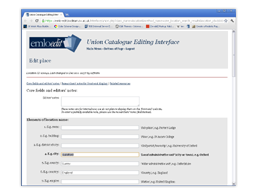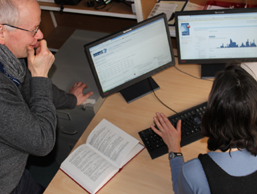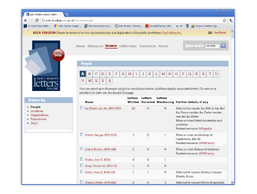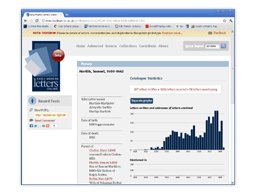Infrastructure

Towards a Union Catalogue of Correspondence: Early Modern Letters Online
People involved: Sushila Burgess, Erin Cooper, Neil Jefferies, Kim McLean Fiander, Monica Messaggi Kaya, Michael Popham, Matthew Wilcoxson
The provision of frequent, fast, and inexpensive postal services provided unprecedented opportunities for early modern people to communicate across great distances. However, this development left enormous scholarly challenges in its wake, since reuniting collections of letters deliberately strewn across the globe has been, ever since, an impossible task for the individual researcher.
New digital technologies provide an exciting opportunity to create a new tool and service capable of solving this problem: a scalable, central, freely accessible inventory of correspondence to which individuals and institutions can contribute metadata, texts and images of individual letters, small calendars of individual corpora, and extensive catalogues of institutional holdings.
We are delighted to announce that, after a busy year in private alpha, our new union catalogue designed to meet these requirements – Early Modern Letters Online (EMLO) – is now available for you to try in public beta.
Created by colleagues in Bodleian Digital Library Systems and Services, this fledgling resource pools epistolary metadata and related materials from the following eight launch collections (although we would like to expand it with your help):
- The card catalogue of a significant proportion of the correspondence in the Bodleian Library: 48,695 records
- The correspondence of John Aubrey (1626-97): 1,073 records
- The correspondence of Jan Amos Comenius (1592-1670): 489 records
- The correspondence of Samuel Hartlib (c.1600-62): 4,585 records
- The correspondence of Edward Lhwyd (c.1660-1709): 2,138 records
- The correspondence of Martin Lister (1639-1712): 1,141 records
- The correspondence of John Selden (1584-1654): 355 records
- The correspondence of John Wallis (1616-1703): 2,002 records.
Early Modern Letters Online is structured in two parts:
The ‘Back End’
Edit place screen
Discussing changes
A custom web-based editorial interface – EMLO Edit – permits the contribution, manipulation, refinement, and de-duplication of epistolary metadata by a dispersed community of contributors. It is a robust, user-friendly publishing and curatorial solution, hand-crafted for early modern letter records.
The ‘Front End’
Browse screen
Person profile
A sophisticated yet lightweight suite of discovery services sits over the editorial interface, interrogating and rendering catalogue content for end users. Powerful search and facetting tools are blended with comprehensive category browsing and rapid record retrieval.
Below, Project editor Kim McLean-Fiander provides a rapid-fire introduction to EMLO for delegates at our latest conference Communities of Knowledge: Epistolary Cultures in the Early Modern World (20-22 September 2012):
To explore this beta resource and find out how you can contribute, please visit Early Modern Letters Online (EMLO). We’d like to know what you think, and would appreciate your feedback on this work in progress.
Launch Early Modern Letters Online






 Join
Join 